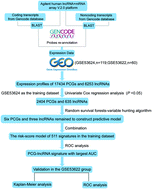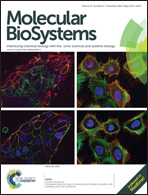Protein-coding genes combined with long non-coding RNAs predict prognosis in esophageal squamous cell carcinoma patients as a novel clinical multi-dimensional signature†
Abstract
Esophageal carcinoma is one of the most malignant gastrointestinal cancers worldwide, and has a high mortality rate. Both protein-coding genes (PCGs) and long non-coding RNAs (lncRNAs) have been shown to play an important role in the development of malignant tumors. However, the clinical significance of PCGs combined lncRNAs is yet to be investigated in esophageal squamous cell carcinoma (ESCC). Using probe re-annotation, univariable Cox regression and the random survival forest algorithm to identify PCG–lncRNA combinations predictive of the overall survival, we found a signature comprised of three PCGs (ANGPTL7, OBP2A, SLC27A5) and two lncRNAs (RP11-702B10.1, RP11-523H24.3) to have the highest accurate prediction, with an area under ROC curve (AUC) of 0.85 in the training group and 0.63 in the test group, and it was significantly associated with the survival of ESCC patients in the training group (median survival: 32.2 months > 60 months, P < 0.001). The application of the signature to the test group showed similar prognostic values (median survival: 39.3 months vs. >60 months, P = 0.03). The chi-square test and multivariable Cox regression analysis showed that the three-PCG, two-lncRNA signature was an independent prognostic factor for patients with ESCC. Stratified analysis suggested that the PCG–lncRNA signature combined with the TNM stage could more accurately categorize ESCC patients. Our study suggests that the three-PCG, two-lncRNA signature has clinical significance for the prognosis of patients with ESCC. This signature can serve as a potential auxiliary biomarker of the TNM stage to subdivide ESCC patients more precisely.


 Please wait while we load your content...
Please wait while we load your content...